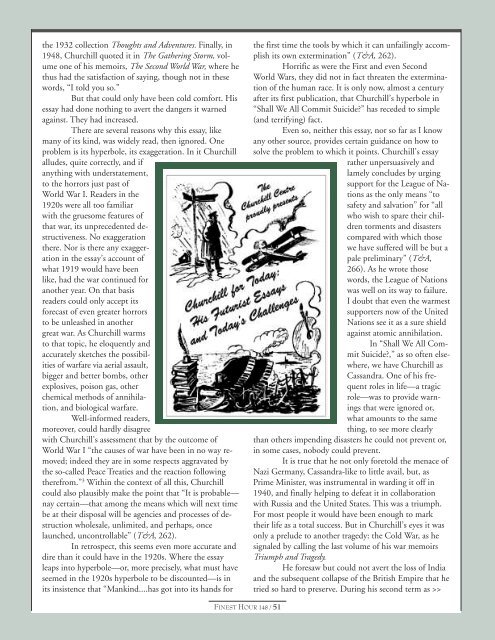You also want an ePaper? Increase the reach of your titles
YUMPU automatically turns print PDFs into web optimized ePapers that Google loves.
the 1932 collection Thoughts and Adventures. Finally, in<br />
1948, <strong>Churchill</strong> quoted it in The Gathering Storm, volume<br />
one of his memoirs, The Second World War, where he<br />
thus had the satisfaction of saying, though not in these<br />
words, “I told you so.”<br />
But that could only have been cold comfort. His<br />
essay had done nothing to avert the dangers it warned<br />
against. They had increased.<br />
There are several reasons why this essay, like<br />
many of its kind, was widely read, then ignored. One<br />
problem is its hyperbole, its exaggeration. In it <strong>Churchill</strong><br />
alludes, quite correctly, and if<br />
anything with understatement,<br />
to the horrors just past of<br />
World War I. Readers in the<br />
1920s were all too familiar<br />
with the gruesome features of<br />
that war, its unprecedented destructiveness.<br />
No exaggeration<br />
there. Nor is there any exaggeration<br />
in the essay’s account of<br />
what 1919 would have been<br />
like, had the war continued for<br />
another year. On that basis<br />
readers could only accept its<br />
forecast of even greater horrors<br />
to be unleashed in another<br />
great war. As <strong>Churchill</strong> warms<br />
to that topic, he eloquently and<br />
accurately sketches the possibilities<br />
of warfare via aerial assault,<br />
bigger and better bombs, other<br />
explosives, poison gas, other<br />
chemical methods of annihilation,<br />
and biological warfare.<br />
Well-informed readers,<br />
moreover, could hardly disagree<br />
with <strong>Churchill</strong>’s assessment that by the outcome of<br />
World War I “the causes of war have been in no way removed;<br />
indeed they are in some respects aggravated by<br />
the so-called Peace Treaties and the reaction following<br />
therefrom.” 3 Within the context of all this, <strong>Churchill</strong><br />
could also plausibly make the point that “It is probable—<br />
nay certain—that among the means which will next time<br />
be at their disposal will be agencies and processes of destruction<br />
wholesale, unlimited, and perhaps, once<br />
launched, uncontrollable” (T&A, 262).<br />
In retrospect, this seems even more accurate and<br />
dire than it could have in the 1920s. Where the essay<br />
leaps into hyperbole—or, more precisely, what must have<br />
seemed in the 1920s hyperbole to be discounted—is in<br />
its insistence that “Mankind....has got into its hands for<br />
the first time the tools by which it can unfailingly accomplish<br />
its own extermination” (T&A, 262).<br />
Horrific as were the First and even Second<br />
World Wars, they did not in fact threaten the extermination<br />
of the human race. It is only now, almost a century<br />
after its first publication, that <strong>Churchill</strong>’s hyperbole in<br />
“Shall We All Commit Suicide” has receded to simple<br />
(and terrifying) fact.<br />
Even so, neither this essay, nor so far as I know<br />
any other source, provides certain guidance on how to<br />
solve the problem to which it points. <strong>Churchill</strong>’s essay<br />
rather unpersuasively and<br />
lamely concludes by urging<br />
support for the League of Nations<br />
as the only means “to<br />
safety and salvation” for “all<br />
who wish to spare their children<br />
torments and disasters<br />
compared with which those<br />
we have suffered will be but a<br />
pale preliminary” (T&A,<br />
266). As he wrote those<br />
words, the League of Nations<br />
was well on its way to failure.<br />
I doubt that even the warmest<br />
supporters now of the United<br />
Nations see it as a sure shield<br />
against atomic annihilation.<br />
In “Shall We All Commit<br />
Suicide,” as so often elsewhere,<br />
we have <strong>Churchill</strong> as<br />
Cassandra. One of his frequent<br />
roles in life—a tragic<br />
role—was to provide warnings<br />
that were ignored or,<br />
what amounts to the same<br />
thing, to see more clearly<br />
than others impending disasters he could not prevent or,<br />
in some cases, nobody could prevent.<br />
It is true that he not only foretold the menace of<br />
Nazi Germany, Cassandra-like to little avail, but, as<br />
Prime Minister, was instrumental in warding it off in<br />
1940, and finally helping to defeat it in collaboration<br />
with Russia and the United States. This was a triumph.<br />
For most people it would have been enough to mark<br />
their life as a total success. But in <strong>Churchill</strong>’s eyes it was<br />
only a prelude to another tragedy: the Cold War, as he<br />
signaled by calling the last volume of his war memoirs<br />
Triumph and Tragedy.<br />
He foresaw but could not avert the loss of India<br />
and the subsequent collapse of the British Empire that he<br />
tried so hard to preserve. During his second term as >><br />
FINEST HOUR 148 / 51

















